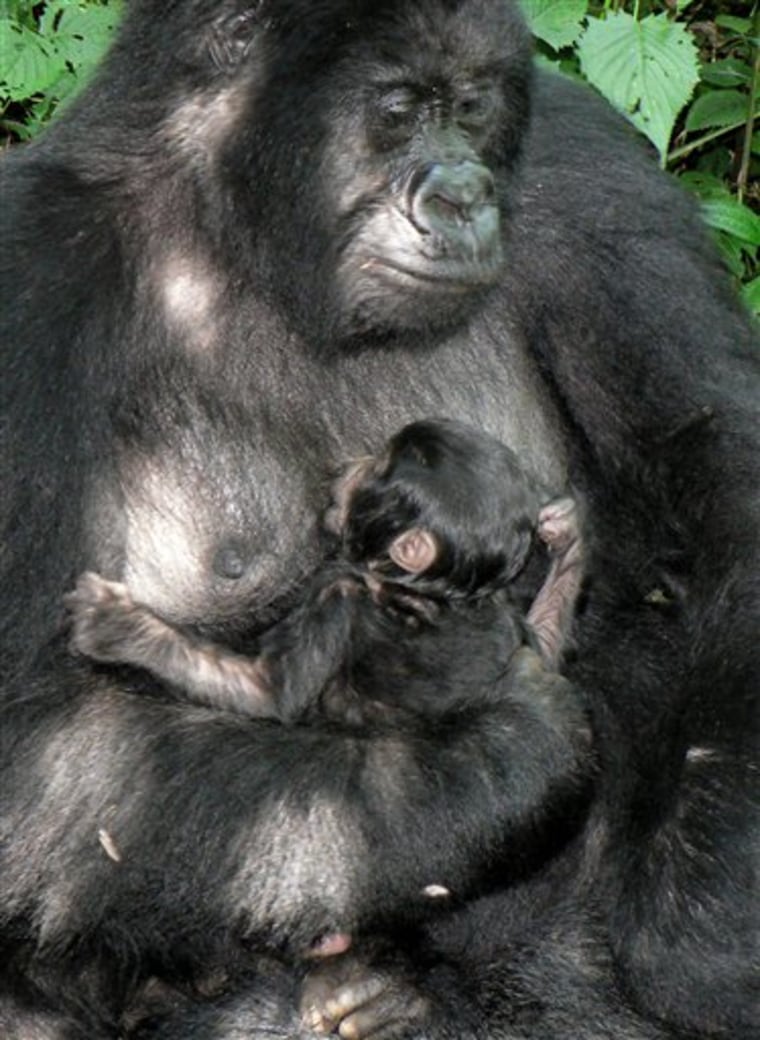Conservationists announced the birth of a rare mountain gorilla in eastern Congo, where rebels have been accused of killing and eating the endangered animals.
The tiny gorilla, named Ndeze, was born Feb. 17 in Congo's Virunga National Park, home to some of the world's last 700 mountain gorillas, said Samantha Newport of the conservation support group WildlifeDirect.
"It's incredibly positive. These gorillas have managed to survive a 10-year civil war," Newport said from the park. It is "an absolute miracle and testament to the work of the rangers, who worked throughout the war without receiving a salary, and to conservationists from all over the world."
Last month, the London-based Africa Conservation Fund and local park officials accused rebels loyal to renegade army commander-turned-warlord Laurent Nkunda of slaughtering two of the animals for food. Nkunda commands thousands of fighters in the vast country's lawless east who have clashed sporadically with government troops.
Local park ranger Paulin Ngobobo met with rebel officials in late January and brokered a verbal agreement to stop the killings, Newport said.
Home to about 80
Ndeze is the 12th member of a gorilla family living in a sector of the park called Mikeno that is home to about 80 gorillas, though a precise census has been impossible to carry out because of ongoing insecurity.
It was not known whether Ndeze was male or female, as it would be difficult to visually determine the baby's sex for several months, Newport said.
About 380 mountain gorillas live in Virunga Volcanoes Conservation Area, which is shared by Congo and neighboring Rwanda and Uganda. The other 320 of the gorillas live in Uganda's Bwindi Impenetrable Forest.
Despite the constant threat of poaching and war, the population in Mikeno is estimated to have risen by about 14 percent, Newport said.
Richard Leakey, a conservationist credited with helping end the slaughter of elephants in Kenya during the 1980s who now chairs WildlifeDirect, also praised the birth.
"The mountain gorillas have been under enormous pressure for many years, and a newborn is always a positive step toward protecting these animals," Leakey said. "We should not forget that this is the product of enormous effort and sacrifice on the part of African rangers, many of whom have paid the price of this success with their lives."
Dozens of rangers killed
Some 97 rangers working in Virunga park alone have been killed over the last decade by armed groups and poachers.
Virunga Park was established in 1925 as Africa's first national park and was classified as a U.N. World Heritage Site in 1979. The 1994 Rwandan genocide saw millions of refugees spill across the border into Congo, marking the beginning of an era of unrest, lawlessness and clashes between militias and myriad rebel groups. Since then, the park has been ravaged by poachers and deforestation.
The last remaining hippo populations in Congo are in Virunga and are also on the verge of being wiped out. Conservationists have blamed rebels and militias for slaughtering them, and say more than 400 were killed last year, mostly for food. Only 900 hippos are left, a huge drop from the 22,000 reported there in 1998.
Mineral-rich Congo, which held its first democratic elections in more than four decades last year, is struggling to recover from a broader 1998-2002 war that drew in the armies of more than half a dozen African nations.
